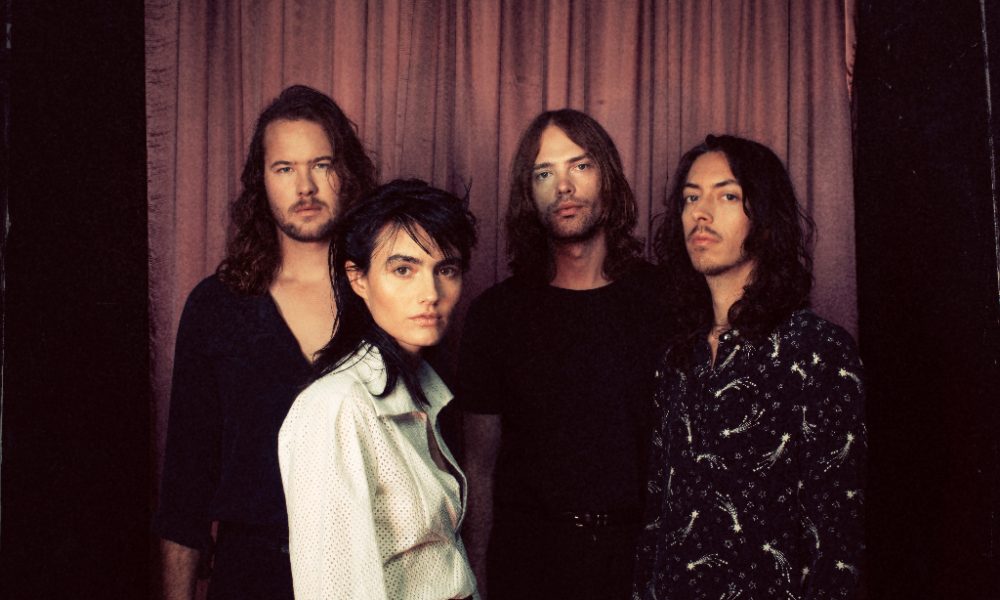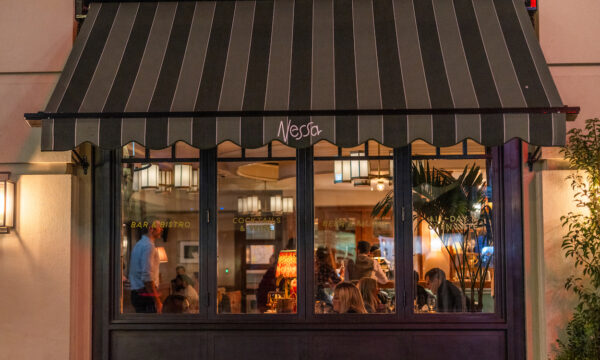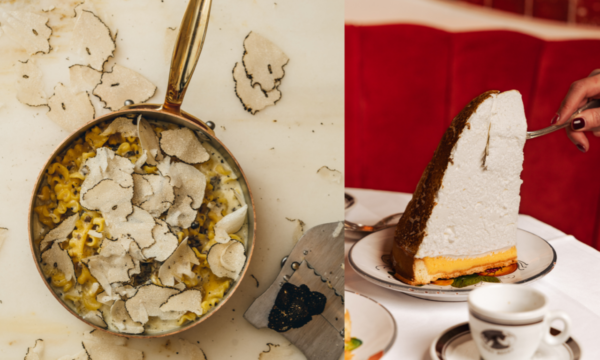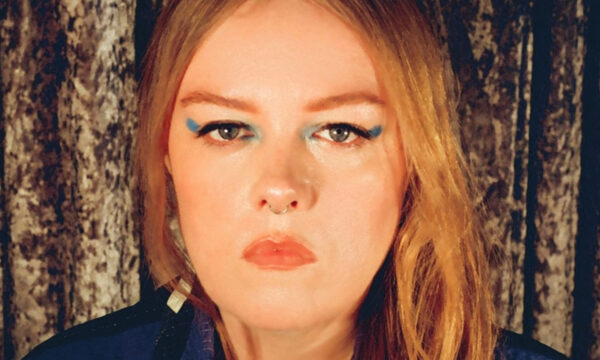The Preatures: An interview with singer Isabella Manfredi and guitarist Jack Moffitt

Australian rock band The Preatures landed in London for a single date of an international tour for their newly released album Girlhood, a bold record exploring the contradictions and challenges of being a modern woman. The album has just been nominated for Best Rock Album at the Aria Awards. First formed in 2010, the group features Isabella Manfredi (singer/keyboard), Jack Moffitt (guitar/producer), Thomas Champion (bass) and Luke Davison (drums). Part of this second LP is also the track Yanada, an original deep song about the world of Indigenous Australian culture, written in collaboration with Dharug Songwoman Jacinta Tobin.
We caught up with Isabella Manfredi and Jack Moffitt before their concert at Moth Club on Tuesday night to talk about their latest album, rocking international audiences, and the craft of songwriting.
How do you think your new album Girlhood differs from your first album Blue Planet Eyes?
Jack Moffitt: I think this is a more introverted, personal, emotional record. The first one came from a sort of urge, while this second was definitely written from a different place. It’s much more introspective.
Girlhood focuses on the contradictions of being a modern woman. Were there any songs or stories that particularly inspired you?
Isabella Manfredi: I am influenced by what is happening in the world, all the time, as a woman. And I guess the thing I was reflecting on with this record was that when I grew up in Sydney I was afforded any privilege and every chance. I was told that I could do whatever I wanted and be whatever I wanted to be, and I had no sense of any limitations. Then, in puberty, having relationships with young boys, going out, partying, having my first sexual experiences, particularly, I understood that there were lots of ways that I was expected to be. And they hit me like a slap in the face, all of a sudden! And then growing up, being in the music industry – like most industries – it’s still a really tough place for women.
I was thinking about all of this stuff when I was writing the record, consciously and subconsciously. For some songs, I wasn’t intending to write about sexism or misogyny. But a lot of that was about my own misogyny, my own inner critique. I think that was what I wanted to explore in the record; less about the external world than my own, how I take the external voices, and projections and kind of internalise them. So, it’s a contradiction.
So, if you have to find three adjectives to go with modern woman, what they would be?
IM: Contrary, messy, tenacious
Your track Yanada has a very distinctive sound and evokes another time and place. How important is it for you to bring the cultural and historical influences of Australia into your music?
IM: We are Australians, and I think we’d always make music from that place. I mean we have a lot of American influences, a lot of Americano countries, rock and roll, British rock and roll, but we are an Aussie band. For me it was really important to do a harmony out of this record, because I wanted to write about what it was like to grow up as a girl in Sydney. And, Jack, you really crafted that song to sound like remembrance…
JM: Dream, memory… Somebody asked me a question about why do we want to do a record to sound Australian and I gave the exact answer. We did all this touring, and then when we came home, we realised that that was ourselves: that’s the selves that we are projecting into the world, because that is how we grew up and that is the place we come from. To pull the spirit of that place into the sound of what we were doing was important for us: to feel that we have actually spent some time at home, for the first time in a while! Because… you know, you miss your home. And there were a lot of ways we wrote that missing into the sound of Yanada: it’s this longing for lost things, growing up in things we were taught and things that were around in our land but we don’t always understand or have the courage to be taught when we were in school. It was a really deeply emotional experience.
And music is one of the best way to communicate and share with the world…
JM: Yes, because it doesn’t have to be explained sometimes, you can just play that out.
Izzi you’ve said previously that when you’re writing songs you think about how you can make people feel the most in the least amount of time. Is this always a challenge?
IM: Yes, that was what I tried to do on the first record. The second one, this record that we have just done, it was more about how I make myself feel. I wasn’t really thinking about other people so much. But, yes, I really like songwriting craft. Just stealing ideas, get them down, write the basic simple form of those, I think it’s actually difficult. We are really about simplicity. And it’s quite hard to do simple things well.
JM: It’s easier to make it all flowery. But stepping away and trying to make it really simple, it can be a challenge. And I think we really loved that challenge.
Jack, you said earlier that it’s easier to play music to share and connect. Don’t you feel, though, that there’s too much to be said in one song at times?
JM: That’s why you write albums! You are totally right. I think we definitely learnt a lot of things, like a lot of harnesses in making this record. We spent 12 months making it, and that amount of time, the length of the songs, it can sometimes be forever! It’s long enough to the point that there is a sort of dying on the vine or something, and you have to find new ways to keep rolling. That’s like being in a relationship anytime, whether it’s a band or a writing relationship, or in a relationship with a piece of work.
It is always going to be subject to what’s happening within you. We didn’t expect to find that depth of good emotion. I think that’s because of a lot of reasons, not least of which we kept coming back to this place that we can’t define and that is more easy to express through playing than through things we can say… I cannot find words to describe it, that’s why we sing it!
What has it been like playing your songs for audiences across Australia, and now Europe?
JM: It’s amazing!
IM: I just feel grateful that we are back, over here. And we get to play in London! I mean, it’s quite a great thing for bands from Australia to make their way over here.
How did the reactions to your music differ across countries?
JM: There is always differences. It’s a kind of game you play with, where you got, not stereotyped, but you’ve got your relationship with Berlin, and you got your relationship with Zurich, and you’ve got your relationship with London. You come back and the next time it’s totally different to the last time! You can never pigeonhole in any place. I think doing touring like we did in the first years of us, getting out, getting off the island, and just seeing how much these experiences were worth it, that was nice.
We were really lucky that we have been able to come back to London. This is the sixth time we have been here? I don’t even remember how many times we have been here… It feels very natural to be here, whereas for the first visits we were like, “What is this place? What are all these people here? There’s so much going on!”. Then you go to, like, Berlin, and you are like, “Oh my God, what is this place? There’s so much going on!”. Once you got through some of those initial shocks of being outside in the world, you find new pieces of yourself, new pieces of that city, new pieces in there, new pieces of all things you have been chasing. I think something I always wanted to do is travelling, all the time. I am lucky to be able to do it.
IM: The Aussies are notoriously bad. So if you have made it in Sydney, I reckon, as a band, and you can capture the audience there, you can do it anywhere.
JM: It’s funny, because they are not easily impressed there. You come to anywhere else in the world, where their responses are a bit more immediate, or at least something that you can grapple with a lot faster. It seems to me it took years to grapple with people like us. It took years for people to start noticing what we were doing. It was like, “What’s wrong with us? What are we doing wrong?”.
IM: We just decided to work with that!
JM: Yeah, we decided to work with that. It was good we grew up in a tough town.
Who are your greatest musical influences?
IM: I really like great singers, like Mina, I love Mina, the Italian singer. I like a lot of soul and country singers like Gladys Knight, Martha Reeves and the Vandellas, Emmylou Harris, Patsy Cline. I just love rich voices, full of soul. And then, on the footside of that, I really like voices like David Byrne. I really like idiosyncratic voices like Bob Dylan. Voices that were in their time almost an anti-voice, an “anti” for what the time considered professional.
JM: They were a kind of “against the grain”, sort of renegades. Patti Smith is another one. I think we are at this point now in history where we can take from everything. The way people got really deep knowledge of something, and you put on a collage, that’s not [happening] anymore. I mean that specialising deep thing people used to get, like really deep into country writers – there’s a whole thing in Nashville that’s very much the same way as it used to be, all old world mentality: “This is the way you do things, this is how you craft it, down, these are the people you need to learn from”. Because everything is so open now, it’s up to you to be looking for things, the principles that you are just after.
I think it’s making from really interesting personalities. All those people you were talking about, like Dylan, Patsy Cline, Patti Smith or whoever, they were just as influenced by the kind of people that we are influenced by. Maybe it’s not the actual work, maybe it’s the things behind the work that we were looking at. The experience, the attitude, the way the people love their songs. That’s how I started to look at things differently. Not like “make yourself different from everybody else”, but rather trying to find out your inner self. It sounds really complicated…
IM: I also really like a lot of Australian artists, bands that we grow up with, like DMA’S, Tommy O’Dell who found DAM’S – I think he has a great voice. Bad Dreems, Julia Jacklin. There are a lot of really good music in Australia at the moment.
Finally, you have just been nominated for the Best Rock Album at the Aria Awards. Do you think this is going to change your future decisions, your career in general?
JM: I doubt it.
IM: We are not going to win!
JM: We are not going to win, it’s a strong category. We have been lucky to be nominated for four Arias, or something like that. It’s always nice to be recognised in a group. A lot of people – actually everybody who has been nominated in that category – we know, to some extent we are friends with. It’s nice to see that somebody is recognising you as part of a thing and not as an island, or too freakish to be part of anything – you are actually part of a group, that’s really nice. But, for the rest, I don’t know.
IM: It’s not going to change what we are doing, that’s the answer!
Cristiana Ferrauti
For further information and future events visit The Preatures’ website here.
Read our review of The Preatures live at Moth Club here.
Watch the video for Yanada here:





















Facebook
Twitter
Instagram
YouTube
RSS